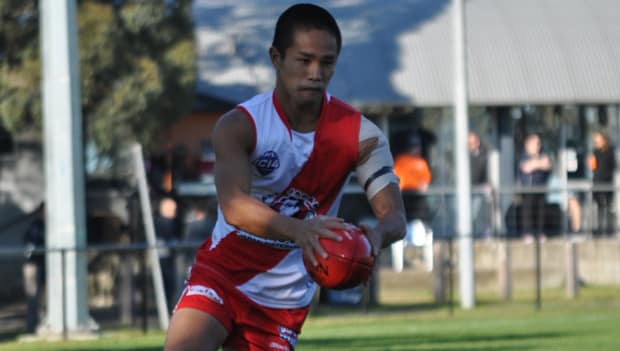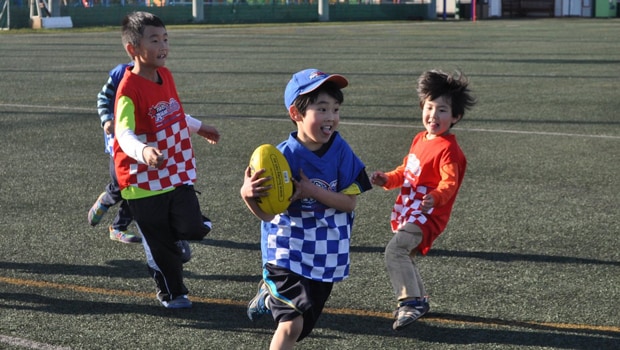In Tokyo, Japan soccer, rugby, baseball and basketball occupy the attention of the city’s 13.5 million people.
Tennis and volleyball courts litter the city, while the national sport of Sumo Wrestling also captures the hearts and minds of millions.
When the city’s gymnasiums or AstroTurfed playing fields are free from their usual sport it’s not uncommon to see a young man dressed in the GIANTS’ striking colours of orange and charcoal, surrounded by a group of perplexed local children.
The man is Michito Sakaki, AFL Japan’s Head of Development and he’s teaching them Australia’s game.
In 2015 Sakaki held 29 clinics with close to 1,600 children participating; all the while training and playing in the Japan AFL with the R246 Lions.
He’s driven by a passion for the game and a strong desire to see a Japanese born and raised player make it to the heights of the AFL.
“The actual goal is to build the Tokyo GIANTS football club and conduct a combine for young players in Japan, and then to win the International Cup,” Sakaki said.
“In the near future, I believe that a Japanese player will debut in an AFL game.
“AFL is not only a physical game, but a psychological game.
“It suits Japanese athletes.”
While an AFL competition was founded in Japan in 2004 the growth of locals taking up Australian Football is still slow and steady.
“Kicking an oval ball is rare in Japan, so people who look at one of my clinics or training ask what sports do you play?” Sakaki said.
“At first, it is hard to explain to Japanese people that AFL is different from Rugby and American football.
“They always throw a football at first.”
The 33-yeary-old is a pioneer of the game in his home country.
His football career began in 2002 when, as a promising 18-year-old soccer player, he was invited to try Australian Football by an Australian expatriate.
Reflecting on his first experience of playing the game, Sakaki echoed the sentiments of many who came before him.
“Where should I run?” he said.
“There are many many options, so I had no idea what should I do next.
“But it was very fun for me. I was very excited.”

It didn’t take long for Sakaki to fall in love with and dominate the game despite his inexperience and his height.
At 165cm Sakaki is just two centimetres shorter than the AFL’s smallest currently listed player, the Western Bulldogs’ Caleb Daniel.
“Many types of players can be a hero,” Sakaki said.
“Tall, quick, strong, smart, endurance...it doesn’t matter.”
Sakaki’s footballing ability didn’t go unnoticed by those around him.
In his first season of Football he was selected to represent Japan in the Australian Football International Cup.
Three years later the ball winning midfielder won the JAFL best and fairest and was again selected in Japan’s team headed to Melbourne for the 2005 installment of the International Cup.
During the tournament Sakaki starred for the Samurai and alongside teammate Tsuyoshi Kase was invited to train at the Australian Institute of Sport Academy in Canberra.
While Sakaki and Kase were trailblazers of the code in Japan, there was one Australian keeping a close eye on the pair.
Known for his out of the box thinking and experimental flair, then Essendon coach (and later inaugural GIANTS coach) Kevin Sheedy made one of his more outlandish decisions.
He invited the pair to train with his players.
In February of 2006 Sakaki and Kase were included in an Essendon intra-club match.
Despite lining up against professionals who had played the game for most of their lives, Sakaki proved his footballing abilities, collecting 13 possessions and taking two marks.
After training with the side for most of the pre-season, Sakaki was selected in Essendon’s side to play an unofficial match against the Sydney Swans at North Sydney Oval.
The game against the previous year’s premiers was a 17-a-side game in the middle of February.
Looking back on that day Sakaki remembers one particular detail.
“I was so nervous I couldn’t eat breakfast, it was the first time in my life that had happened!” he said.
“But everyone supported me so I enjoyed the game… I still cannot believe I played for Essendon.”

Following the taste of professional football Sakaki flew home to Japan before returning to Australia; signing for the Wodonga Raiders in Victoria’s Ovens and Murray Football League.
“I learned so much more about AFL at Wodonga,” Sakaki said.
“At a training, most of the drills were very fresh for me but everyone encouraged me and I felt like part of the team.
“I also learnt about coaching and umpiring, I did football clinics for Japanese people living in Melbourne and at a Japanese school.”
After playing a season with Wodonga, Sakaki moved to the Heatherton Football Club in the Southern Football League in 2007, before returning to Tokyo to take on a development position at AFL Japan where he remains today.
“I still train as a player, in 2014 I was selected as the best and fairest player of AFL Japan’s top league and played in my fifth International Cup,” Sakaki said.
“Using the knowledge I picked up in Australia I run skill sessions and umpiring session … More than 1,500 people tried AFL last year, the numbers are increasing.”
In the early days of growing the game in Japan Sakaki was greatly supported by Essendon before he visited the GIANTS’ Learning Life Centre at Sydney Olympic Park in 2014.
“I asked the GIANTS about support for AFL Japan and they were kind enough to give me their support,” Sakaki said.
“The GIANTS sent a lot of equipment like jumpers and prizes for kids and items for the annual AFL Japan party.”
Sakaki is now an avid GIANTS fan, inspired by their willingness to support AFL Japan.
“I’ve built a website for GIANTS supporters in Japan and am planning on starting the Tokyo GIANTS Football Club,” he said.
While building the game in his home country is important, Sakaki has some unfinished business down under.
“I have played in the International Cup five times but I haven’t achieved my goal of winning a championship,” he said.
“I’m proud of Japanese football and I believe we can win a championship with solid team work.”
Sakaki will need to wait until next year to appear at his sixth international cup and hopefully lead his nation to glory.
For now his focus is on educating Japanese children and adults about Australian Football or what Sakaki calls: “The best sport in the world.”
The GIANTS are proud to celebrate the 2016 Toyota AFL Multicultural Round during their match against Collingwood at Spotless Stadium on Saturday, July 9.
Multicultural Round highlights the contribution multicultural communities have made to the game’s history and welcomes new communities to embrace Australian Football as fans, players, umpires or administrators.




